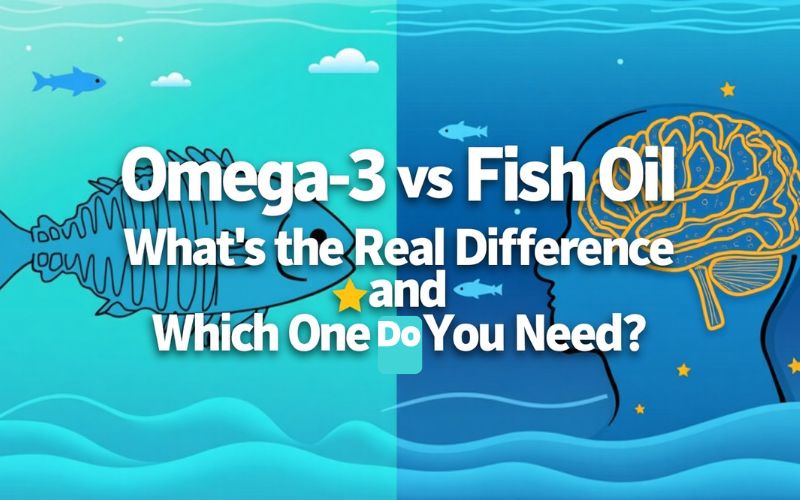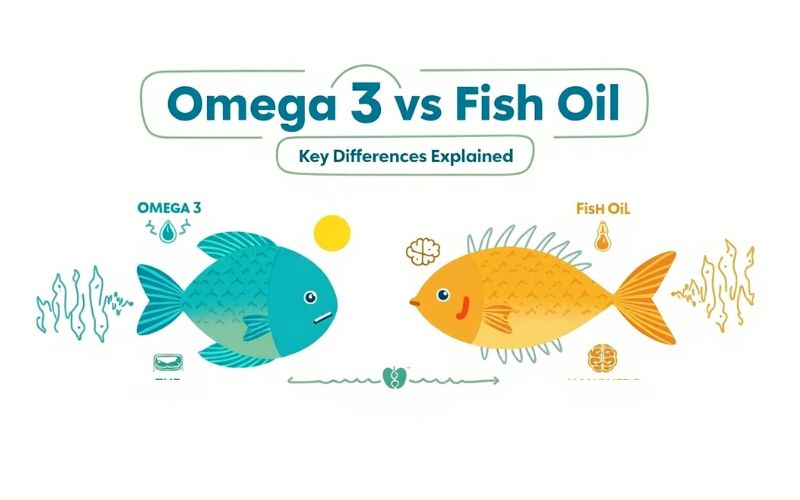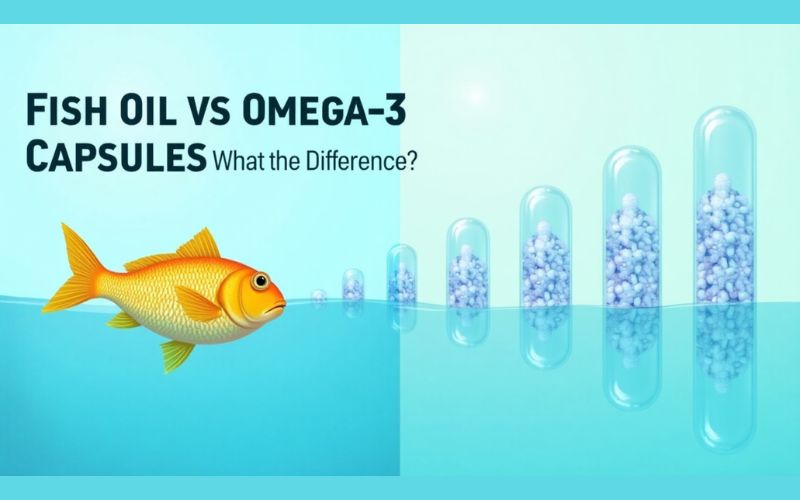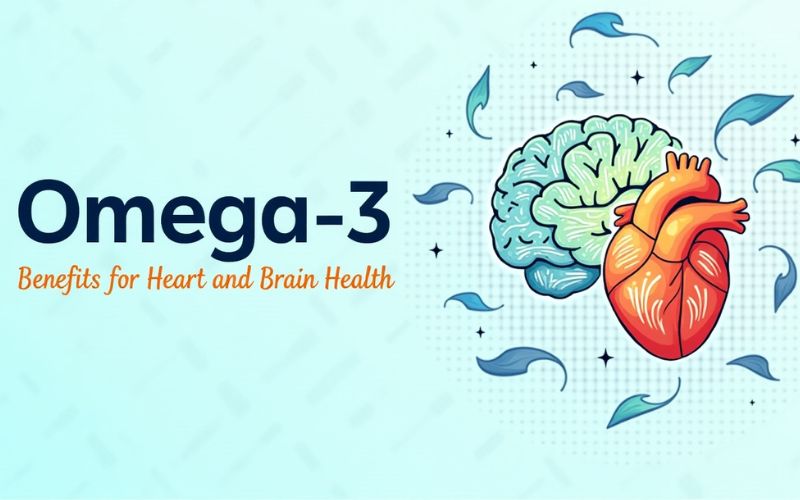Omega-3 fatty acids and fish oil supplements are often used interchangeably in health conversations—but they’re not exactly the same. If you’ve ever been confused about what sets them apart or which one is right for your body and lifestyle, you’re not alone.
This guide will help you understand the key differences between omega-3s and fish oil, their benefits, and how to make the best choice for your health.
Table of Contents
What Are Omega-3 Fatty Acids?
Omega-3s are a group of essential polyunsaturated fatty acids that play a crucial role in maintaining overall health. Your body cannot produce them on its own, which means you must get them from your diet or supplements.
There are three main types of omega-3s:
- EPA (Eicosapentaenoic Acid): Supports heart health and reduces inflammation.
- DHA (Docosahexaenoic Acid): Essential for brain development, eye health, and cognitive function.
- ALA (Alpha-linolenic Acid): Found in plant-based sources like flaxseed and walnuts. The body can convert ALA into EPA and DHA, but the conversion is inefficient.
What Is Fish Oil?
Fish oil is a supplement made from the tissues of oily fish such as mackerel, sardines, anchovies, and salmon. It contains high concentrations of EPA and DHA, the two most beneficial omega-3 fatty acids.
There are two primary forms of fish oil used in supplements:
- Natural triglycerides: Closest to how omega-3s are found in whole fish.
- Ethyl esters: A more processed form that allows for higher concentrations but may be less bioavailable.
So, fish oil is essentially a vehicle that delivers omega-3s, particularly EPA and DHA, in supplemental form.
Key Differences Between Omega-3 and Fish Oil
Although they’re closely related, understanding the difference between omega-3 and fish oil helps you make a smarter, more targeted supplement choice.
Omega-3 Is a Nutrient; Fish Oil Is a Source
Omega-3s refer to the specific fatty acids your body needs—EPA, DHA, and ALA. Fish oil is one way to get those fatty acids, particularly EPA and DHA. So, all fish oil contains omega-3s, but not all omega-3s come from fish oil.
Not All Omega-3 Supplements Are Fish-Based
Omega-3s can also be found in:
- Algae oil – a plant-based source of DHA and sometimes EPA, perfect for vegetarians and vegans.
- Flaxseed oil and chia seeds – rich in ALA but lack EPA and DHA unless converted by the body.
This means omega-3 supplements are available in both marine and plant-based forms, while fish oil is always derived from fish.
Quality, Purity, and Dosage Vary
Fish oil supplements vary in the amount of EPA and DHA they provide. Some may contain fillers or lack adequate purification, which can lead to heavy metal contamination if not properly tested.
High-quality omega-3 supplements, especially those made from algae or purified fish oil, are third-party tested for purity and potency.
Side Effects and Taste
Fish oil supplements are more likely to cause fishy burps, aftertaste, or digestive discomfort, especially if taken on an empty stomach. Some omega-3s from algae or plant sources avoid this issue and are easier on the digestive system.
Health Benefits of Omega-3s (and Fish Oil)
Whether you get your omega-3s from fish oil or other sources, the health benefits are significant and well-researched.
- Supports Heart Health: Omega-3s reduce triglycerides, lower blood pressure, and support overall cardiovascular function.
- Boosts Brain Function: DHA is critical for brain development and may help improve memory, mood, and focus.
- Reduces Inflammation: Omega-3s have anti-inflammatory properties that support joint health and help reduce chronic disease risk.
- Supports Vision and Eye Health: DHA is a structural component of the retina, promoting long-term eye health.
- Improves Skin Health: Omega-3s help maintain skin hydration, reduce acne, and combat signs of aging.
These benefits apply whether you’re getting EPA and DHA from fish oil or plant-based omega-3s.
Which One Should You Take?
The answer depends on your dietary preferences, health goals, and individual needs.
Choose Fish Oil If:
- You eat fish and want a natural, potent source of EPA and DHA.
- You’re looking for cardiovascular, joint, or brain health support.
- You want a well-researched and readily available supplement.
Choose Omega-3 (Plant-Based or Algae) If:
- You’re vegetarian or vegan and want to avoid animal-based products.
- You’re sensitive to fish or dislike the taste.
- You’re focused on sustainability and clean sourcing.
Whatever you choose, the most important thing is consistency and quality. Look for third-party tested supplements with clearly labeled EPA and DHA content.
Final Thoughts
To summarize: omega-3 is the nutrient, while fish oil is a source of that nutrient. The best choice for you depends on how your body responds, your dietary preferences, and your personal health goals.
If you’re unsure, consult with a healthcare provider or nutritionist to help determine the ideal dosage and form of omega-3 for your needs.
Looking to boost your daily omega-3 intake with high-quality, science-backed supplements? Visit Nutritional World to explore a curated selection of premium fish oil and plant-based omega-3 options.
FAQs About Omega-3 vs Fish Oil
Is omega-3 the same as fish oil?
Not exactly. Omega-3 refers to the beneficial fatty acids like EPA and DHA, while fish oil is a supplement that provides these omega-3s, typically from fatty fish.
Which is better: fish oil or plant-based omega-3?
Both have their benefits. Fish oil is rich in EPA and DHA, while plant-based omega-3s (like algae oil) are ideal for vegetarians and offer similar advantages without the fishy aftertaste.
Can I take omega-3 every day?
Yes, daily omega-3 intake is generally safe and recommended for overall health. Just make sure you’re taking the right dosage based on your dietary needs and health goals.


























